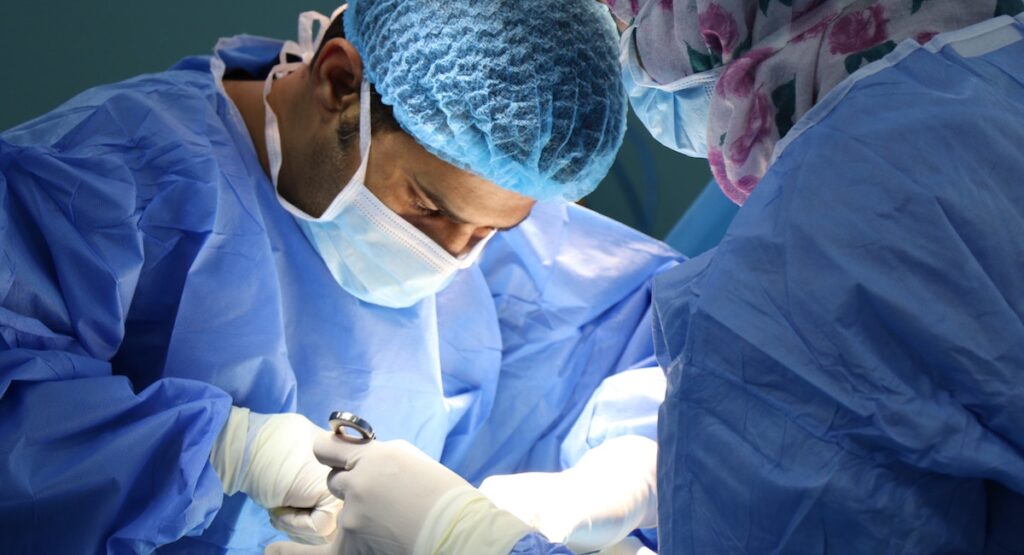
How to Become a Veterinarian: Degrees, Career Path, Salary, and More
Loving animals isn't enough to become a vet. You have [...]

Surgery is typically medicine’s last line of defense. When medication and other types of patient care fail to solve a problem, surgeons step in and use brute force to restore a person’s health or quality of life.
It sounds primitive, but in reality, it’s anything but. Surgery may involve the physical manipulation, reconstruction, and amputation of tissue, but it’s precise, delicate, and to some degree, an art. To become a surgeon takes patience, willpower, a high level of coordination, and extraordinary confidence. You need to be sure of yourself to succeed as a surgeon; there’s no room for self-doubt when you’re cutting into a patient. The stakes are just too high.
If the life of a surgeon sounds intense, that’s because it is. This is a stressful career full of extreme highs and lows. As a surgeon, you have the godlike ability to cure disease, heal injuries, and change people’s lives for the better. The only problem is that your skills won’t always be enough. Sometimes the disease wins, or the injury is too severe. It’s not a role that everyone is cut out to play.
Want to know more about how to become a surgeon—and whether you are up to the challenge? In this article, we’ll cover:
It isn’t easy to summarize what surgeons do because there are so many surgical specialties, surgical procedures, and techniques. Surgeons deal with the most extreme cases of illness and injury, but they also will manipulate the body on demand for patients who want cosmetic procedures. Surgeons use scalpels to cut things out of the body, but they can also use high-tech robotic arms to repair it. Surgery is typically the most invasive treatment option, but surgeons can also perform minor procedures in a doctor’s office.
What sets surgeons apart from other doctors may simply be that they use instruments that act as extensions of their hands to treat illnesses and injuries. They do this in hospitals, ambulatory surgery settings, urgent care clinics, and doctors’ offices, though surgeons also work in academia and in government offices.
While surgeons oversee all aspects of surgery—from diagnosis to post-operative care—they don’t do it alone. Surgeons work with a team that can include specialists and primary care providers, nurses, medical technicians, anesthesiologists, and other surgeons (in the case of complicated or lengthy surgeries).
Surgery is a medical specialty with many subspecialties. The American College of Surgeons recognizes 14 surgical subspecialties:
Those aren’t the only surgical specialties out there. Some surgeons specialize in transplant surgery, bariatric surgery, podiatric surgery, and endocrine surgery, among other specialties. As you think about how to become a surgeon, make time to look into the various surgical subspecialties. It’s possible to specialize in general surgery, but you may discover that you find one area of the body or one type of surgery particularly fascinating.
When your goal is to become a surgeon, you should start thinking about your education before you’ve even chosen a bachelor’s degree program. Many medical specialties and surgical subspecialties are hugely competitive, and it pays to know what it will take to get into your specialization of choice. That way, if you’re interested in an exceptionally competitive subspecialty, you can do what it takes to land the residency that will get you in.
In the United States, there’s no single specific pre-med undergraduate degree path for someone who wants to become a surgeon. Pre-med is not an actual major at most universities. That said, you will need to meet the requirements for entry into medical school if you plan to become a surgeon, and that will be a lot easier when you earn a bachelor’s degree in biology or chemistry from a university with a strong pre-med support program. These programs connect aspiring surgeons with mentors, medical school advisors, tutors, and the kinds of research and clinical opportunities mentioned above.
Look for bachelor’s degree programs that include courses in microbiology, physics, biochemistry, human anatomy, English, and advanced math at universities that have high medical school acceptance rates. Plan to study hard, as most highly ranked medical schools will only accept candidates with a GPA of 3.5 or above. The best only take those who graduate at the top of their classes.
To make yourself a more attractive medical school applicant, make time for community service, medical shadowing programs, student organization involvement, and research during your undergrad years. Do you enjoy sleep? Enjoy it now while you can. You won’t be getting much while you’re in school.
Next stop, medical school. When your goal is to become a surgeon, look for medical school programs that offer concentrations in the surgical specialties in which you’re most interested (e.g., microsurgery, cosmetic surgery, craniofacial surgery, hand surgery, microsurgery, reconstructive surgery, or burn surgery).
Medical school isn’t all about hands-on training. In fact, your first two years will mostly involve classroom study. It won’t be until your second year that you’ll start doing clinical rotations at the medical center or centers associated with your school. Most rotations last six or twelve weeks and consist of tours through family medicine, pediatrics, obstetrics, gynecology, surgery, psychiatry, anesthesiology, radiology, neurology, emergency medicine, and oncology. Some rotations are part of the core medical school curriculum, while others are elective.
Doing clinical rotations can feel like a job and should be treated like one, but it’s important to remember that you’re not even a doctor at this point in your journey. You’ll technically be a doctor after graduating from medical school and passing the United States Medical Licensing Examination (USMLE), but that doesn’t mean you’ll be ready to become a surgeon… or even to practice medicine.
In addition to getting good grades, becoming an Alpha Omega Alpha Honor Society member, and acing the USMLE scores, you should plan on looking for opportunities to do research and publish and choosing a relevant sub-internship. As Dr. Richard Beddingfield, author of “Med School Uncensored,” put it in the St. George’s University blog, “The rat race doesn’t stop with acceptance to med school!”
There are many surgery residency pathways open to a newly-minted doctor who wants to become a surgeon. Residencies are a period of postgraduate medical training that involves practicing medicine under the supervision of a senior clinician registered in a particular specialty. Aspiring surgeons should apply to the best residencies for their chosen subspecialty. The American College of Surgeons has guides to help you find them.
After applying (and in some cases being interviewed), you will submit a ranked list of your choices to the National Resident Matching Program. Residency programs then submit lists of candidates in order of acceptance, and the National Resident Matching Program uses an algorithm to match candidates to residencies. Rarely, candidates will fail to match with a residency—usually because they only applied to very competitive residency programs. Should that happen, you can usually get a list of residencies that failed to fill all their open spots from your medical school and request a placement. You can also apply for a one-year research fellowship or take a gap year and then re-apply.
Residencies for aspiring surgeons last from five to eight years, depending on your chosen subspecialty. For example, a general surgery residency lasts five years, while an otolaryngology residency consists of one year of general surgery training plus three years of otolaryngology training and one year of elective training. If you plan to specialize in oral and maxillofacial, your residency will include a four-year graduate degree program in dentistry plus a four-year general surgery residency. The ACS provides a complete list of residency lengths by subspecialty.
If you don’t already know, the answer is: longer than you probably think.
All doctors have to complete four years of undergrad and four years of medical school. After that, most only have to complete a three-year residency before they can practice independently. Surgeons, however, still have years to go. In addition to lengthier residencies, surgeons in particularly competitive subspecialties may also need to do research or complete a fellowship to be considered for a job.
All in all, you may be studying and training for 15 years before you can become a full-fledged surgeon—and your residency years won’t be easy. You’ll be on-call for days at a time and working 80-hour weeks on minimal sleep.
What you won’t be doing is making a ton of money. While the average surgeon income in the US is $388,429 (and you could make more than $500,000 depending on your subspecialty), residents typically only make about $52,000 in the first year and only slightly more in subsequent years.
The board certification or certifications you pursue will depend on your chosen subspecialty, but in all cases, those certifications will be granted by a surgical board approved by the American Board of Medical Specialties. Getting certified is a way of showing employers and patients that you have completed the requisite training in your subspecialty and have what it takes to pass a rigorous examination.
Additionally, you can apply for the FACS credential from the American College of Surgeons. This involves submitting to an in-depth evaluation of your professional competence and ethical fitness and committing to the highest and fairest standards of care, pricing, and behavior.
Eventually, after years of training, surgeons make great money, but that’s not a good reason to become a surgeon. Yes, you’ll eventually join the ranks of high-income earners, but not until after your residency, and chances are good you’ll have amassed a significant amount of medical student loan debt.
Again: becoming a surgeon isn’t the best way to get rich quick. You will sweat, struggle, and toil during your training years and endure a tremendous amount of stress for the majority of your career. In other professions, you pay for a mistake in money or time. When you become a surgeon, making a single mistake can cost someone their life. Even when you lose a patient through no fault of your own, you may still feel responsible.
The upside is that you’ll save or enhance many more lives than you lose in your operating room. It’s easy to find meaning in this career, and you’ll undoubtedly see the evidence that your work makes a difference. This is also an exciting job—one that’s rarely boring because so much is riding on everything you do. If you thrive under pressure, you’ll enjoy it. If you don’t, you should choose another medical specialty. This is not a career you should enter without weighing all the pros and cons very, very carefully. Becoming a surgeon can be the best decision you’ll ever make, or it can lead to career-tanking burnout if you can’t handle the highs, lows, and immense responsibilities.
Questions or feedback? Email editor@noodle.com

Loving animals isn't enough to become a vet. You have [...]

On average, health services managers earn over $100,00 per year. [...]

The states with the highest average salaries for psychiatric mental [...]

It's difficult to keep track of everything you can do [...]

Few, if any, jobs require two master's degrees, but having [...]
Categorized as: Medicine, Nursing & Healthcare